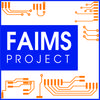Digital Antiquity, Arizona State University

Digital Antiquity is a multi-institutional, non-profit organization dedicated to ensuring the long-term preservation of irreplaceable archaeological data and to broadening access to these data. It oversees the use, development, and maintenance of the Digital Archaeological Record (tDAR), an international repository for the digital records of archaeological investigations, organizations, projects, and research. Digital Antiquity was created through a collaboration between the
Archaeology Data Service, the University of Arkansas, Arizona State University, the Pennsylvania State University, the SRI Foundation, and Washington State University. It is currently hosted by Arizona State University.
EAGLE Project

The Europeana network of Ancient Greek and Latin Epigraphy is a best-practice network co-funded by the European Commission, under its Information and Communication Technologies Policy Support Programme. EAGLE will provide a single user-friendly portal to the inscriptions of the Ancient World, a massive resource for both the curious and for the scholarly.
The EAGLE Best Practice Network is part of Europeana, a multi-lingual online collection of millions of digitised items from European museums, libraries, archives and multi-media collections.EAGLE will collect, in a single readily-searchable database, more than 1.5 million items, currently scattered across 25 EU countries, as well as the east and south Mediterranean. The project will make available the vast majority of the surviving inscriptions of the Greco-Roman world, complete with the essential information about them and, for all the most important, a translation into English.
Federated Archaeological Information Management Systems
FAIMS is funded by the Australian National eResearch Collaboration Tools and Resources (NeCTAR) program. It is led by the University of New South Wales in collaboration with participants from 41 organisations, including universities, archaeological consultancies and heritage agencies in Australia and overseas. FAIMS was launched on 5 June 2012 with the goal of assembling a comprehensive information system for archaeology and aims to deliver a suite of compatible tools which will be accessible to archaeologists through a single portal.

